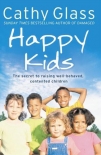Happy Kids by Cathy Glass (best autobiographies to read .txt) 📕

Read free book «Happy Kids by Cathy Glass (best autobiographies to read .txt) 📕» - read online or download for free at americanlibrarybooks.com
- Author: Cathy Glass
Read book online «Happy Kids by Cathy Glass (best autobiographies to read .txt) 📕». Author - Cathy Glass
Talk to your young teen about the importance of education, apart from it being a legal requirement. Explain the value of education, particularly in respect of job prospects. You will need the support of the school if your child is truanting, and to work closely with them, so that the school secretary phones you if your son or daughter fails to arrive, and you phone the school if your child is genuinely off sick. If necessary, and practical, take your child to school; at least you will know they have gone in through the school gates, and you going is likely to be a deterrent to truanting in its own right. Not many teens think its ‘cool’ to have their parents take them to secondary school. As with any negative behaviour, appropriate sanctions need to be applied if cooperation has not been forthcoming and the child persists in the behaviour.
Sanctions for teens
At this age (and older), talking, reasoning and discussing are paramount ingredients for good parenting. A lot of negative behaviour can be corrected, eventually, through this medium, particularly if the boundaries and guidelines are already in place. However, there will be times when your young teen is not open to rational debate, and despite your talking to them at length, their negative behaviour persists. The bottom line is that your child has to alter his or her behaviour and comply, and there will be a sanction if they don’t, so that they will remember and learn for the next time.
Sanctions at this age will obviously be different from those you used when your child was younger. Stopping half an hour’s television for a young teen is unlikely to be much of a sanction. You will know your child, and know what sanctions work best, but here are a few suggestions:
* The young teen is ‘grounded’, i.e. not allowed out when he or she would normally have expected to go. Make sure the grounding is reasonable – stop one outing for rudeness or for coming in late, not an entire month.
* The young teen has to be in earlier than usual, for example after spending time with a friend.
* The young teen has to complete a household chore, for example tidying the shed, clearing out the cat litter tray, etc.
* A treat is stopped, for example football club, pocket money, a sleepover.
Let your young teen feel your disapproval when necessary; show it, as they show you theirs. After a negative incident, don’t be your usual chatty self, unless of course your child has apologised and the air is clear. A slight coolness in your manner, together with your explanation of what your young teen has done wrong (it isn’t always obvious to them), will reinforce that he or she has overstepped the boundary; their behaviour is not acceptable, and you thoroughly disapprove.
Another approach is to withhold your services. Postpone doing something for your teen that you had intended to do: for example, perhaps you were planning on rushing into the town straight after work to buy Tom new football boots. If Tom has just ‘kicked-off’ (excuse the pun), then postpone the trip – ‘I’m sorry, Tom, you have just spoken to me very rudely, I don’t feel like rushing into town right now. Perhaps tomorrow, when I feel happier.’ This is quite reasonable, and gives Tom the clear message that his negative or rude behaviour is completely unacceptable and will not be tolerated by you. Don’t feel bad about being cool towards him for a short period, or withdrawing your services for a short while. You wouldn’t put yourself out for an adult who had just given you a load of grief, unless you wanted to end up being treated like a doormat, which is what your young teen will do if you don’t maintain his or her respect.
Rewards for teens
Obviously don’t forget to praise Tom or Claire when he or she has done something positive; children (and adults) of all ages respond to verbal praise and encouragement. However, I would not give rewards (for example, extra pocket money) for positive behaviour at this age, as it is likely to result in your teen expecting it and reverting to negative behaviour if the reward is not forthcoming. By all means give extra pocket money for extra chores, for example, washing the car or mowing the grass, but by this age acceptable behaviour should be the assumed norm, the baseline from which you work, not something done as a favour to mum or for the promise of a reward.
Using the 3Rs with teens
Request, Repeat and Reaffirm, but allow extra time for your young teen to do as you have asked, as they tend to function in a different time zone to adults.
Claire has been on the house phone for the last hour and you are waiting to use it. Don’t bellow from one end of the house to the other,‘Claire, get off that damn phone!’She won’t. For the first Request, go within reasonable speaking distance, so that she can hear you but you are not being over-intrusive, and say firmly but politely,‘Claire, will you finish on the phone in five minutes, please? I need to use it.’Five minutes passes and Claire is still on the phone – probably talking to a friend she has spent all day with at school. Return to where you stood before and Repeat. Say firmly and politely,‘Claire, I’ve asked you to





Comments (0)